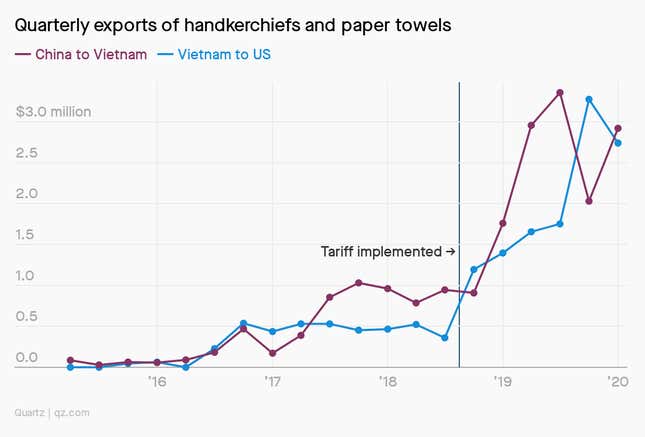Good morning, Quartz readers!
Here’s what you need to know
Huawei revenues only rose 13.1% in the first half of the year. That’s a disappointing figure for a firm that saw revenues jump 23.2% in the same half of 2019, and a sign that a US pressure campaign, a looming ban in the UK, and a global pandemic are starting to slow the Chinese tech giant’s indomitable growth.
US tech companies teamed up against visa restrictions for international students. Google, Facebook, Microsoft, and more than a dozen others urged a US judge to block a Trump administration rule that would force students to leave the country if their universities don’t hold in-person classes in the fall. The firms argued that the measure would do irreversible economic damage.
Hong Kong clamped down on the pandemic and protests. After new outbreaks of Covid-19, masks are mandatory on public transportation, restaurants must tighten their hours, certain businesses must close and Hong Kong Disneyland must shut its doors. Meanwhile, the British government offered 3 million Hong Kongers a path to UK citizenship, and said it expects 200,000 to arrive.
China announced retaliatory sanctions against US senators. In response to US sanctions on Chinese officials over alleged human rights violations against ethnic minority groups in Xinjiang, Beijing denied wrongdoing and imposed its own punishments on prominent Republican lawmakers.
Polling to teach about polling
As the US presidential race heats up, polls are starting to emerge that show Joe Biden with a huge lead over Donald Trump. But polling data is widely believed to have fallen short in Trump’s first race in 2016, when Democratic candidate Hillary Clinton was favored to win. That may not actually be the case, and we’re ready to explain why.
To start, we’ll need our own poll. So here it is, the most important question facing the global economy in 2020. Or at least something that, for some reason, we tend to ask each other in the newsroom.
Would you rather be a dog or a ghost?
Stay tuned for the next episode of We Promise This Weird Thing We Just Asked You to Do is Going Somewhere.
Charting handkerchief exports (really)
By analyzing trade data, Quartz identified likely candidates for Chinese goods transshipped through third countries and then on to the US in an effort to avoid tariffs. One example of a product’s trade that looks suspicious is “handkerchiefs and paper towels.”

In 2015 and early 2016, there were almost no exports of handkerchiefs and paper towels from China to Vietnam or from Vietnam to the US. In the first quarter of 2020, both export pairings reached almost $3 million. Meanwhile, handkerchief and paper towel exports to the US from China fell from over $40 million in the first quarter of 2018 to $23 million in 2020. That’s not the only category that’s trading suspiciously.
✦ For members: An inclusivity lesson from Watchmen

Countless organizations are pondering how to have meaningful conversations about race. But for Cord Jefferson, a TV writer on HBO’s critically-acclaimed superhero series Watchmen, lengthy discussions about topics like police brutality and the history of Black Wall Street were all in a day’s work.
Jefferson shared tips from the writers’ room of HBO’s Watchmen on how to build a more inclusive culture. Here’s a sampling:
- Don’t shoot down ideas, build on them.
- Know your blind spots—and hire people who can see what you can’t.
- Remember that Blackness is not a monolith.
- Give center stage to people who aren’t big stars—yet.
Our new field guide on how to build an anti-racist company contains big ideas for making big progress. Get started with a seven-day free trial!
You asked about countries doing it right
We’ve heard of a lot of countries getting their Covid-19 response wrong (e.g., the US, Singapore), but who’s getting it right? What are they doing differently? —Robert
It’s the question that should be on everyone’s lips as we move into a phase where we’re looking at our recent past to prepare for an immediate future that’s not looking so hot. And we do have an answer for you: Taiwan. Its government leveraged technology to trace and quarantine sick people, upped its mask production, trained communities for lockdowns through large-scale simulations, put traveling quarantines in place, and even employed humor to quash fake news about hoaxes. It’s currently holding steady with only 0.03 deaths per 100,000 people, and its economic projections are consequently much less grim than in countries like the US with much higher death rates.
As STAT reported in late June, Taiwan’s relative success containing Covid-19 was no accident—it began its journey with a functioning healthcare system and fresh memories of SARS. Robust testing, contact tracing, and isolation methods were supported by an existing system that used centralized, real-time, electronic health data recorded on each individual’s health card. What the rest of the world takes (✦) from Taiwan’s experience remains to be seen.
Surprising discoveries
The pandemic has given a few lucky mannequins a shot at TV stardom. As shows resume production, directors are using dummies as stand-ins during crowd shots and sex scenes.
Japan has a battery-operated bullet train. The newest design can run on reserve power even if a natural disaster knocks out the electrical grid.
British nursing home residents are recreating classic album covers. The seniors have spoofed Adele, David Bowie, and Madonna.
Turkmenistan mandated masks to protect against “dust.” The reclusive nation, which denies having any Covid-19 cases, also advised citizens to stay one meter apart, but did not say why.
“Irregardless” is a word. Despite the indignation of a few fastidious grammarians, Merriam-Webster upheld the “nonstandard” word’s place in the dictionary.
Our best wishes for a productive day. Please send any news, comments, album cover parodies and celebrity mannequin sightings to hi@qz.com. Get the most out of Quartz by downloading our app on iOS and becoming a member. Today’s Daily Brief was brought to you by Susan Howson and Nicolás Rivero.